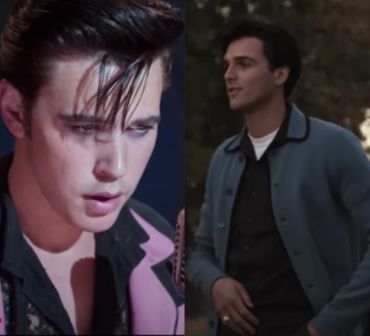
“I don’t know why people make art a blood sport,” Jacob Elordi said in an interview with E! News. “They turn into the colosseum, it’s (obscenity) absurd.”
Almost 50 years after Elvis Presley’s death, two movies on the life of the King were released a little over a year apart. With two actors portraying one of the most impersonated figures in history–in two different films in such a tight window–it may be easy to point out the similarities and differences between the two performances. However, comparing the actors’ work detracts from the meaning of both films.
The biopic “Elvis”, directed by Baz Luhrmann, is as glamorous as it is tragic, much like the star’s real life. “Elvis” is narrated by his cutthroat manager, Colonel Tom Parker, played by Tom Hanks, and focuses more on the lucrative business that was the rock and roll star’s life.
Separately, in the biopic “Priscilla”, directed by Sofia Coppola, Elvis is portrayed through the eyes of his wife, Priscilla, played by Cailee Spaeny. The film is not about Elvis, but only the intimate effects he had on Priscilla’s life. Rarely in the movie do viewers see the glitz and glam of the Elvis Presley lifestyle, and instead exist in the toxicity that often surrounded it.
Austin Butler (“Elvis”) and Jacob Elordi (“Priscilla”), the lead actors in both films, may have been portraying the same person, but they were playing totally different roles. Because of this, the two prepared for their parts in very different ways. Both have been vocal about their varying methods of training for their parts which has created room for many unfair comparisons and judgements.
Butler has been very open about his preparation for the role and the effects it had on him. Prior to filming, Butler had completely immersed himself into the life of Elvis. He hired numerous coaches to help train him in all aspects of “Elvis” including the iconic voice, his diet, and captivating body movements. There was an intense and respectable amount of dedication that went into Butler’s training that ultimately resulted in what he described to IndieWire as an “existential crisis.”
On the contrary, Elordi took more of a laid-back approach. With Priscilla Presley herself being an executive producer of the movie, Elordi was able to utilize her as a resource and understand who Elvis was as a person. Though his preparation was not as intense, his performance was just as phenomenal.
The hard work these actors put in is clear while watching both films, even earning Priscilla’s stamp of approval for both. While it is inevitable to have a preference when watching these movies, it can be voiced without tearing down the other actors. Acting, like most art forms, is subject to interpretation and preference. One artists’s performance may not resonate with everyone, but a job well-done nevertheless deserves its respect.



